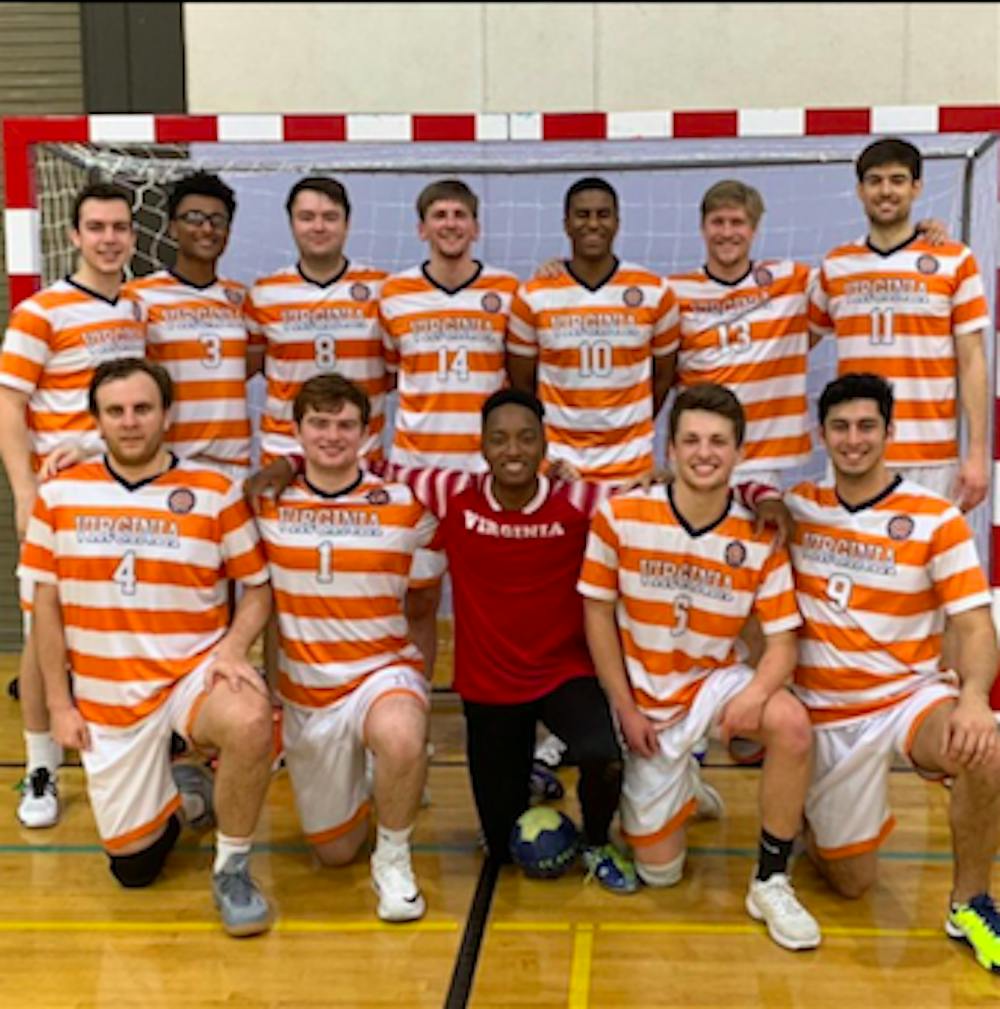If you walk into Slaughter Recreation Center on a Sunday at noon, you’ll likely find a few people in the weight room or a couple climbing the new rock wall. Other than that, it seems empty. But when you open the door to the gym, Slaughter comes alive. Shoes squeak and balls fly. These aren’t basketballs, though — there aren’t any pickup games. This is a team handball practice.
Virginia’s Team Handball Club plays in the Northeast Team Handball League, competing against the best collegiate and adult teams in the country. Because there is no professional team handball league in the United States, this is the highest level of domestic competition. But the club is about more than success on the court. While most time is spent practicing at Slaughter, members of the team say that they enjoy time with teammates more when it’s spent at a house on 14th Street — simply called the Handball House.
Ultimately a club sport like team handball is emblematic of its name — it’s just as much a social club as it is a competitive sport. Because of this social aspect, the club has a house for its members that gets passed down to teammates each year. Sometimes the house has as many as 12 members, while other years it has just a handful. Sometimes there might even be a resident who isn’t on the team. Regardless, the point is to provide a collective space to build a community.
Lincoln Ambrose, third-year Batten student, vice president of the Handball Club and a resident of the Handball House, points to the social aspect of the team as one of the reasons he keeps playing.
“There are a few reasons why I like handball,” Ambrose said. “But the first is to have a community. I think a lot of club sports have this as one of their main perks.”
A house provides an environment for building relationships among teammates somewhere other than on the court, but that isn’t to say that there aren’t any competitive benefits. Establishing a fun social environment can build team chemistry and increase retention, maximizing the chances of keeping top talent around.
“Having a space to hold events helps to build … community that fosters dedication to the team,” Ambrose said. “Building a community is the best way to get people dedicated to the sport.”
For a sport like team handball, which isn’t well known in the United States, retention can be a significant issue, as most students don’t have an emotional attachment to the sport that comes with playing it during their childhood, like they might with soccer or basketball. New members may become interested in other organizations and might even leave the team before they experience their first inter-collegiate competition.
Because of this, the club prioritizes holding events at the beginning of the semester to increase new member engagement. A team’s fun social life can be just as appealing to new members as the sport itself.
Zachary Palas, fourth-year College student and president of the Handball Club, agreed with Ambrose about the ability of a house to help build community.
“One of the most difficult and most important aspects of having a club sports team is getting new members to stick around and actively participate on the team,” Palas said. “The house creates more opportunities for the team to get together, which in turn leads to a closer team with a higher retention rate of new members.”
Unfortunately, a smaller, less popular club like team handball may have difficulty maintaining and passing down a house due to the competitive student housing market. For example, the Handball House consists of residents across three different school years, as there wasn’t enough interest from team members in a single grade level to fill the house. One resident isn’t on the team but was needed just to ensure the lease could be signed.
“Like many others, we always struggle to fit the deadlines of Charlottesville housing,” Ambrose said. “It’s notoriously early for when you need to sign. Obviously, we want to pass this house down, but it’s tough to get people ready in September every year because thinking about next year seems so far away. From experience, a lot of club sports have had this issue where you know you’re going to have the house but filling it early enough is always difficult.”
As the only third-year in the house this year, Ambrose is still searching for other teammates to join him on 14th Street for next school year. This situation represents that of many students across Grounds this time of year. Most housing decisions for next year have not yet been made, creating an air of uncertainty and anxiety.
Other difficulties exist, as well. Sometimes roommate conflicts can carry over to practices or even games, driving a wedge between teammates instead of strengthening their bond.
That being said, the Handball House plays an important role in fostering community among teammates. While difficult to acquire and retain, the house helps strengthen teammates' relationships both on and off the court.






